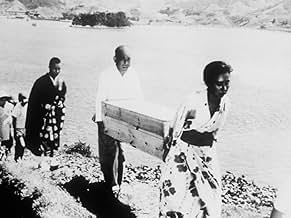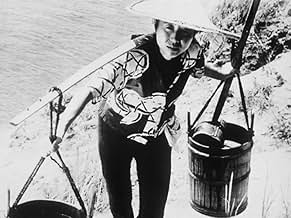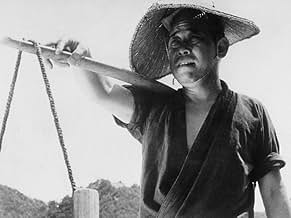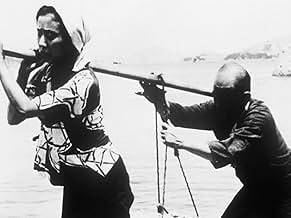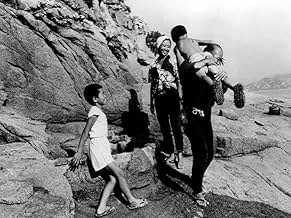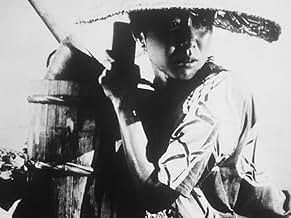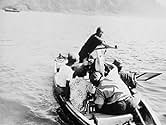CALIFICACIÓN DE IMDb
8.0/10
6.6 k
TU CALIFICACIÓN
Agrega una trama en tu idiomaA family of four are the sole inhabitants of a small island where they struggle each day to irrigate their crops.A family of four are the sole inhabitants of a small island where they struggle each day to irrigate their crops.A family of four are the sole inhabitants of a small island where they struggle each day to irrigate their crops.
- Dirección
- Guionista
- Elenco
- Nominada a1 premio BAFTA
- 5 premios ganados y 1 nominación en total
- Dirección
- Guionista
- Todo el elenco y el equipo
- Producción, taquilla y más en IMDbPro
Opiniones destacadas
I was surfing on the t.v. and came across this incredible "little" film on a French Canadian station. As there is no dialogue and the story is so human and pure, it is truly the most universal picture I've seen. I defy anyone not to be moved by the challenges which the characters face, the realism in the minimalist acting and the beauty of the simplistic black and white camerawork. I've never heard of this film, but I will tell all my friends about it.
I was living next to the Seto Naikai (Inland Sea) at the time this movie was made, and marvel at its matchless, eclectic choice of images and atmosphere to convey the ambiance of the time and place. The photography, music, and restrained acting are perfection itself. The lack of dialogue helps, rather than hinders, its beautiful, simple story. It has captured a Japanese way of life and culture (actually lived by the director---the movie was made as a tribute to his parents) forever and in the very highest artistic sense. The movie is so genuine, so sympathetic to its participants and subject matter, that the viewer is softly, irresistibly, drawn in to share their travails. For years it has been a wonder to me why this classic film has been forgotten. Of the thousands of movies I have seen in my lifetime, this is the finest.
10ewc
If you have ever wondered what a film would be like that exemplifies how the tools of the craft can be used to do powerfully what no other art can do, this film answers the question. It is among the most carefully wrought, least encumbered yet profound movies ever made. The fact that it has long been unavailable in America and Europe in any accessible format reflects very sadly upon us all. (Addendum 15 March 2008 for those of you with region-free players: the English distributor, Eureka, has thankfully released the original widescreen version of the movie in PAL format in its 'The Masters of Cinema Series', #12, with an optional commentary by Shindo and his composer, Hikaru Hayashi. Available from Amazon.uk.)
On a tiny island in the Seto Inland Sea, a small family consisting of husband, wife, and two sons, struggle to get by. They are the island's sole inhabitants, and spend their days fetching water from the mainland and carrying up the steep hill in order to water their crops. One day when the mother and father are away from the island, one of the sons falls ill, and the father races to get help. Their lives are all portrayed in painstaking detail, and the film contains no dialogue whatsoever. The film is directed by Kaneto Shindo, who directed the two brilliant Japanese New Wave horror films, Kuraneko and Onibaba, the only two other films of his I've seen.
This is a break in style and subject for Shindo. The two aforementioned horror films were similarly slow and detailed, but The Naked Island contains no action or atmosphere, but certainly shares their beauty. This is a film that shows how far humanity can be pushed in order to merely get by. The climax of the film (and I don't feel I'm ruining anything by revealing it, the story is not important) has their ill son dying, as his father and the doctor arrive too late. After the funeral, they are forced back to work. The mother, needing to grieve, throws down the water and screams into the ground, as the father watches helpless. Afterwards, she gets up, and methodically resumes watering.
Shindo tackles a universal subject with the neglect of the working class. Filmed with no dialogue, it emphasises their facial expressions and body movements in a way the silent era did, and forces the audience to live through the work they do, every step at a time. The director said he wanted to "capture the life of human beings struggling like ants against the forces of nature," and he certainly does that. The film is slow, and focuses a lot of time on the struggle of carrying the water up the hillside. Yet it's filmed with such elegance, it only hammers their struggle home. This is a beautiful and moving film, that is almost brutal in its relentlessness.
www.the-wrath-of-blog.blogspot.com
This is a break in style and subject for Shindo. The two aforementioned horror films were similarly slow and detailed, but The Naked Island contains no action or atmosphere, but certainly shares their beauty. This is a film that shows how far humanity can be pushed in order to merely get by. The climax of the film (and I don't feel I'm ruining anything by revealing it, the story is not important) has their ill son dying, as his father and the doctor arrive too late. After the funeral, they are forced back to work. The mother, needing to grieve, throws down the water and screams into the ground, as the father watches helpless. Afterwards, she gets up, and methodically resumes watering.
Shindo tackles a universal subject with the neglect of the working class. Filmed with no dialogue, it emphasises their facial expressions and body movements in a way the silent era did, and forces the audience to live through the work they do, every step at a time. The director said he wanted to "capture the life of human beings struggling like ants against the forces of nature," and he certainly does that. The film is slow, and focuses a lot of time on the struggle of carrying the water up the hillside. Yet it's filmed with such elegance, it only hammers their struggle home. This is a beautiful and moving film, that is almost brutal in its relentlessness.
www.the-wrath-of-blog.blogspot.com
10billr-3
I remember this film from my student days. I saw it in an uptown, shabby, art house theatre (when art meant porn) in Philadelphia. I was amazed. As I recall, it is a film without dialog. Not silent, but no dialog. Black and white, but singularly visual. Three, maybe four characters with self- effacing directing and camera work, it was as intimate as small off-Broadway theatre. I've seen nothing since as cinematic, or moving. No one I've ever met, has seen it. But I remember it vividly.
¿Sabías que…?
- Trivia'Hadaka no shima' was made, in the words of its director, "as a 'cinematic poem' to try and capture the life of human beings struggling like ants against the forces of nature."
- ConexionesReferenced in Century of Cinema: Nihon eiga no hyaku nen (1995)
Selecciones populares
Inicia sesión para calificar y agrega a la lista de videos para obtener recomendaciones personalizadas
- How long is The Naked Island?Con tecnología de Alexa
Detalles
Taquilla
- Total a nivel mundial
- USD 14,673
- Tiempo de ejecución
- 1h 36min(96 min)
- Color
- Mezcla de sonido
- Relación de aspecto
- 2.35 : 1
Contribuir a esta página
Sugiere una edición o agrega el contenido que falta



